The Mifepristone Litigation Tracker and Mifepristone Federal Action Tracker provide timely, regularly updated information on the current status of litigation and federal administrative actions that could shape regulation of and acces
On March 6-7, UCLA Law’s Center on Reproductive Health, Law, and Policy, in partnership with Yale Law School and Temple Law School, convened legal scholars and experts for a series of discussions on rebuilding constitutional foundations for equality and reproductive rights and justice post-Dobbs.
Participants explored and debated theories and strategies to advance reproductive and sex equality rights grounded in constitutional and doctrinal principles, fresh historical analysis, and novel legal arguments.
Scholarly Essays on Legal Pathways
In connection with the convening, eleven scholars contributed thought-provoking essays for a Balkinization Symposium on Legal Pathways Beyond Dobbs (April 10, 2025).
Professors Cary Franklin and Mary Ziegler, make powerful cases for further interrogating and resisting the Court’s history-and-tradition approach in Dobbs and other recent cases. As Ziegler argues, relying on history and tradition allows conservative movement leaders and their allies in the judiciary “to speak through past actors to whom they claim to defer . . . to conceal the policy choices they face in critical areas” where they lack support, including criminal abortion bans, interpretation of the Comstock Act and fabrication of “fetal rights.” And, as Franklin proposes, because “too many regulatory traditions violate contemporary understandings of equality for courts to adhere consistently to the results of the history-and-tradition test,” there may be “contexts in which the Court is less willing to disregard concerns about sex equality and basic rights to life and health.” Offering a different tack, Professor Michael C. Dorf encourages progressives to pursue “ideological jujitsu” and “evade the history-and-tradition test” altogether by building out claims to reproductive and sexual freedom grounded in enumerated rights. And with vivid analogy to the fictional monster Cthulhu (imagined by notoriously xenophobic novelist H.P. Lovecraft), Professor Evan D. Bernick argues that modern attacks on reproductive rights and birthright citizenship, like prior incarnations of similar “[m]onstrous institutions and ideas,” such as the Fugitive Slave Act, Chinese Exclusion Act and Comstock Act, can be, and have been, thwarted through a combination of legal and community-based resistance strategies.
Several scholars offer compelling arguments, and cautionary notes, for theorizing ways that equality doctrine or values can vindicate rights related to reproduction, bodily autonomy, gender identity, and family formation. Professor Jessie Hill argues grounding abortion rights in a “right to equality in health care, or a right to health care nondiscrimination,” while recognizing this “equality lens” also “requires dismantling the elective-therapeutic distinction regarding abortion” as itself a product of sexism. Professor Laura Portuondo, observing that the “Supreme Court has extended a broad new vision of equality to religious conservatives,” through recent free exercise decisions, proposes a strategy of extending this First Amendment “anti-devaluation theory of equality” to achieve reproductive justice ends. Meanwhile, Professor Cahill exposes how Dobbs’s revisionist use of “footnote twenty from Geduldig, which held that pregnancy discrimination wasn’t sex discrimination” is an example of “precedent manufactured in real time – and therefore, by definition, not a precedent at all – that lacks grounding in text, history, and actual precedent.” And Professor Douglas NeJaime calls out the need to more “clearly name” how legal appeals to biological or “natural” parenthood hide animus and “smuggle in arguments that rely on sex-based stereotypes” to harm LGBTQ families and women alike. More skeptically, tracing the Court’s methodological inconsistency in case after case, Professor Neil S. Siegel cautions that in the current political moment, it is unlikely the Court will adhere to its interpretive commitments when it comes to equality rights for disfavored groups, particularly transgender people.
Finally, responding to the rise of “fetal personhood” arguments in law and public narratives, Professors Kimberly Mutcherson and Meghan Boone urge autonomy and equality responses to these efforts to erase the personhood of pregnant people. Mutcherson argues that those who would legally “subordinate pregnant women to the nascent lives they carry” cannot offer a secular account for this deprivation of bodily integrity and Boone urges advocates to call this out for what it is – “arguments against women’s equality.”
Collectively, these essays offer multiple pathways for advancing reproductive and sex equality rights under law, with special attention to the Court’s history-and-tradition approach, the realities and challenges of our modern judiciary, and the need for liberty, autonomy, equality, and health rights that redress the related threats to reproductive, racial, and economic justice.
Read the essays in full:
- History & Tradition’s Equality Problem, Cary Franklin
- The History & Tradition of Criminalization, Mary Ziegler
- Enumerating a Post-Dobbs Pathway, Michael C. Dorf
- Cthulhu and the Constitution, Evan D. Bernick
- Abortion Rights as Health Care Rights as Equality Rights, B. Jessie Hill
- Anti-Devaluation as Reproductive Justice, Laura Portuondo
- The Other Footnote, Courtney Cahill
- Biological Parenthood and Inequality, Douglas NeJaime
- The Fate of Bostock’s Formalism After $215 Million Spent on Anti-Trans Ads, Neil Siegel
- The Shared DNA of Roe and Dobbs: Potential Life as a Tool of Subordination, Kimberly Mutcherson
- The Question of Female Personhood, Meghan Boone
The Center on Reproductive Health, Law, and Policy (CRHLP), in partnership with Yale Law School’s Program for the Study of Reproductive Justice and Temple University Beasley School of Law, invites you to Resistance and Reimagining: Perspectives on Reproductive and Gender Justice from the Academy, Advocacy, and Public Service.
This event will feature a panel moderated by CRHLP's Legal and Policy Director, Diana Kasdan. The panel will include Professor Khiara M. Bridges from UC Berkeley School of Law, Leila Abolfazli, Senior Director of National Abortion Strategy at National Women's Law Center, Mary Bonauto, Senior Director of Civil Rights and Legal Strategies at GLBTQ Legal Advocates and Defenders, and Karli Eisenberg, Supervising Deputy Attorney General, CA AG's Office for Healthcare Rights and Access. This event is in person and will be streamed over Zoom, refreshments will be served.
Register here to attend in person or virtually: HTTPS://BIT.LY/March6thRSVP
Read our Experts Q&A, Policy News, Legal News and Food for Thought where we share articles, books, and media you might have missed.
Past Newsletters
September 27, 2025
- New Report on Reproductive Freedom Amendments
- Introducing New Research Director
- Policy News: New study on cash transfer program
- Legal News: CO parental notification lawsuit, WV mifepristone law update
September 13, 2025
- New Report on State Abortion Policies and OBGYN Residents
- Policy News: Mississippi public health emergency
- Legal News: Texas bill to restrict Mifepristone
August 25, 2025
- CRHLP releases regulatory comment to the FDA with partners
- Policy News: Updated clinical guidance from ACOG regarding vaccination
- Legal News: Maine Family Planning's request to restore Medicaid reimbursements is denied
July 19, 2025
- Commentary by Cathren Cohen Published in Journal
- New Update to Shield Law State Law Guide
- Policy News: New study on decline in obstetric services
- Legal News: CO parental notification lawsuit, WV mifepristone law update
July 5, 2025
- United States v. Skrmetti: Turning Back the Clock on Gender Equality by Diana Kasdan, Legal and Policy Director
- Legal and Policy Blows to Reproductive and Maternal Health Care Access for Low-Income People by Melissa Goodman, Executive Director
- New Resource: Mifepristone Litigation Tracker and Federal Action Tracker
- Policy News: Study on early miscarriage in Texas, new #WeCount report released
- Legal News: WI abortion ban struck down, NJ crisis pregnancy center case
June 21, 2025
- Special Edition Academic Year CRHLP Progress Report
June 7, 2025
- Ask the Experts Q&A with Summer Legal Fellow Rebecca Nathan
- Policy News: TX license plate surveillance, EMTALA federally revoked
- Legal News: Petition to FDA to remove Mifepristone restrictions, MI Planned Parenthood abortion care forced to pause
May 24, 2025
- Video Case Explainer: Northland Family Planning Center v. Nessel by Cathren Cohen, Staff Attorney
- Policy News: CA budget revisions, new report on Medicaid and public health, Propublica report on the fetal viability line
- Legal News: FL ruling on parental consent law
May 10, 2025
- Case Explainer: Missouri v. FDA by Amanda Barrow, Senior Staff Attorney and Sofia Espinoza, Legal Fellow
- Policy News: Study on abortion bans' effect on pulmonary care, Mifepristone access rollback bill introduced
- Legal News: Lawsuit filed in MI regarding parental consent to care
April 26, 2025
- Commentary: Yellowhammer Fund v. Marshall - The History and Tradition of the Right to Travel by Diana Kasdan, Legal & Policy Director
- Policy News: Research on maternal mortality post-Dobbs, report on rising level of violence against abortion providers
- Legal News: ND judge rules on religious exemptions for worker accommodations, NV ruling on parental notification law
April 12, 2025
- What Amici Have to Tell the Court: Medina v. Planned Parenthood South Atlantic, by Tarj Patel, CRHLP Legal Extern
- Policy News: 100+ HHS employees fired, TX abortion rule clarification bill introduced
- Legal News: AL rules state's threats to prosecute are unconstitutional, GA drops charges against woman who miscarried
March 29, 2025
- Ask the Experts Q&A with the Legal Fellow Sofia Espinoza on the Unconditional Cash Transfers (UCTs) for Pregnant and Newly Parenting People brief
- Policy News: GA woman arrested after miscarriage
- Legal News: TX provider arrested for providing care, NY blocks TX prosecution of NY doctor
March 15, 2025
- Policy News: WY enacts new abortion requirements, study shows decline in OBGYN access in restrictive states
- Legal News: MT strikes down abortion laws, AZ 15-week abortion ban blocked
March 1, 2025
- Ask the Experts Q&A with Research Data Analyst Leslie Serrano
- Policy News: New state law dataset on medication abortion
- Legal News: Supreme Court declines to hear anti-abortion activist challenge
February 15, 2025
- A Message from Executive Director Melissa Goodman
- Policy News: New study on the effect of abortion bans on infant mortality
- Legal News: TX fines NY doctor, SC hears arguments on state's abortion ban
January 30, 2025
- Ask the Experts Q&A with the Senior Staff Attorney for the Southern California Legal Alliance for Reproductive Justice, Amanda Barrow
- Policy News: Study on use of Ella as an abortion medication, NY governor launches cash assistance program
- Legal News: VT child welfare agency facing lawsuit, Trump Admin moves to limit prosecutions under the FACE act
January 13, 2025
- A Message from Executive Director Melissa Goodman
- Ask the Experts Q&A with CRHLP Legal and Policy Director, Diana Kasdan
- Policy News: ACLU report on reproductive justice while incarcerated
- Legal News: Brittany Watts files lawsuit against hospital and OH law enforcement, ID files lawsuit to continue care under EMTALA
Please join us for a timely event that examines U.S. abortion restrictions in contrast to global trends toward greater abortion protections. Panelists will look to other countries as well as international human rights norms for clarity – and discuss how to bring international standards to bear in the fight for abortion rights at home.
Speakers
- Elise Keppler
- Executive Director, Global Justice Center
- Lara Stemple
- Assistant Dean, Faculty Affiliate of UCLA Law's Center for Reproductive Health, Law, and Policy
- Irum Taqi
- Director of Global Policy, Guttmacher Institute
- Grace Meng - Moderator
- Executive Director, UCLA Law's David J. Epstein Program in Public Interest Law & Policy
- Executive Director, UCLA Law's David J. Epstein Program in Public Interest Law & Policy
Wednesday, September 18, 2024
12:15 PM Pacific Time
In-Person at UCLA Law in Room 1430 and Virtually on Zoom
Shield Laws for Reproductive and Gender-Affirming Health Care: A State Law Guide
After the Supreme Court overturned Roe v. Wade in June 2022 and eliminated the federal constitutional right to abortion, many states enacted bans and further restrictions on abortion.
Shield Laws by Categories of Protection
The protections offered by each state’s shield laws vary. Shield laws may include: (1) Protections Against Out-of-State Investigations and Prosecutions (including specific protections against extradition, arrests, search warrants, subpoenas, witness summons, and state agency assistance in out-of-state investigations or prosecutions), (2) Protections Against Professional Discipline (including specific protections against adverse actions related to providers’ licenses, board discipline, and denial or restriction of facility privileges), (3) Protections Against Civil Liability (including specific protections against application or enforcement of another state’s laws or judgments in the shielding state’s courts, and availability of a “clawback” action to recover damages from litigation in another state as a result of providing, receiving, or assisting in the provision of certain health care), (4) Protections Related to Professional Liability Insurance and Health Plans (including specific protections against an insurer’s refusal to issue insurance, increase in premiums, or denial of coverage based solely on providing protected care and protections for contracts with health plans and insurers), and (5) Protection of Medical Information and Other Data Related to Reproductive or Gender-Affirming Care (including specific protections against disclosure of medical information, location data, providers’ personal information, and data held by businesses providing electronic communications or reproductive health apps). 4 states only offer certain protections by executive order rather than by legislation. The legislatively-enacted shield laws in 8 states explicitly protect provision of care regardless of patient location, which includes telehealth provision.
The chart and maps below show the types of protections offered in each shield law state.
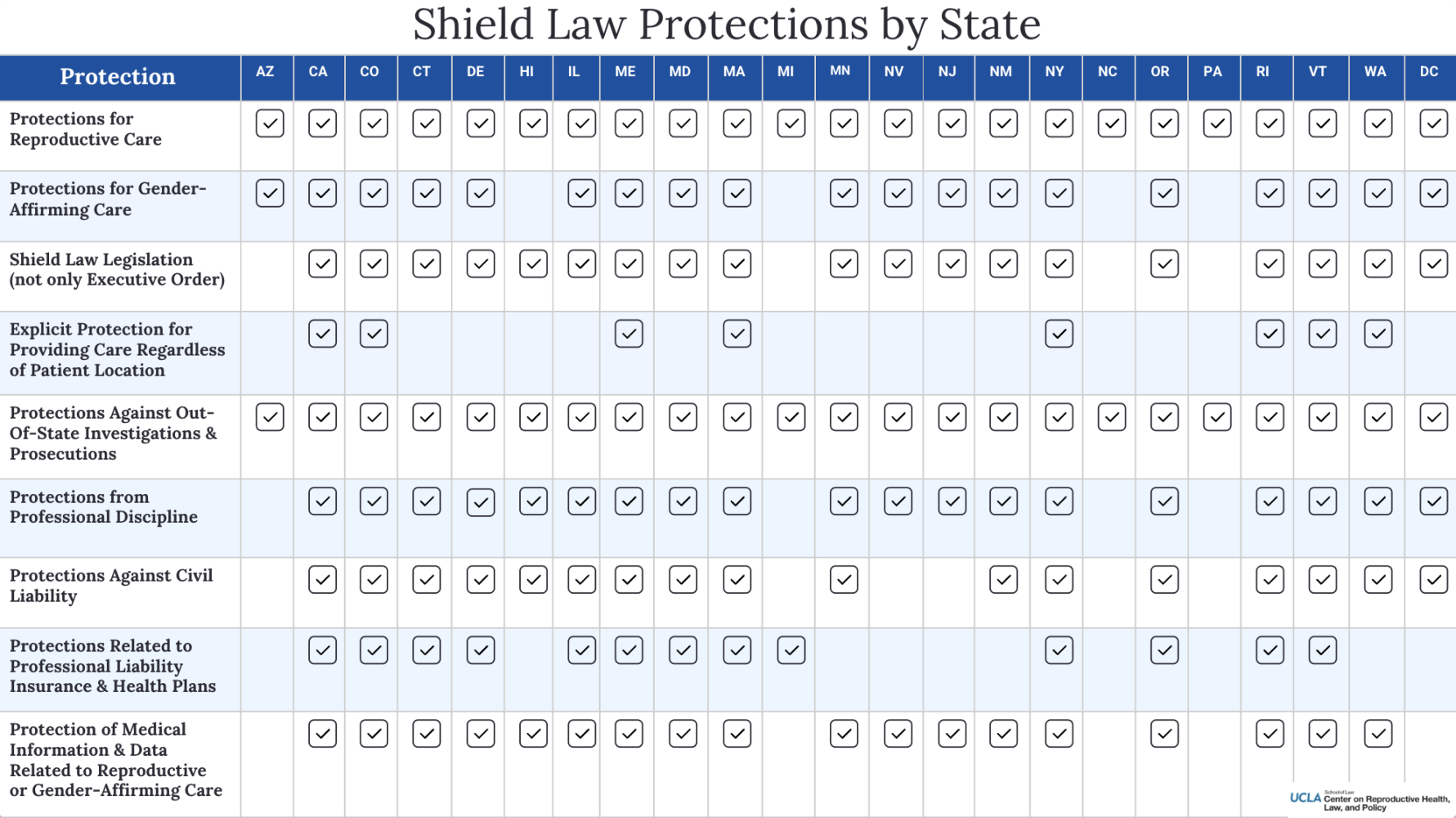
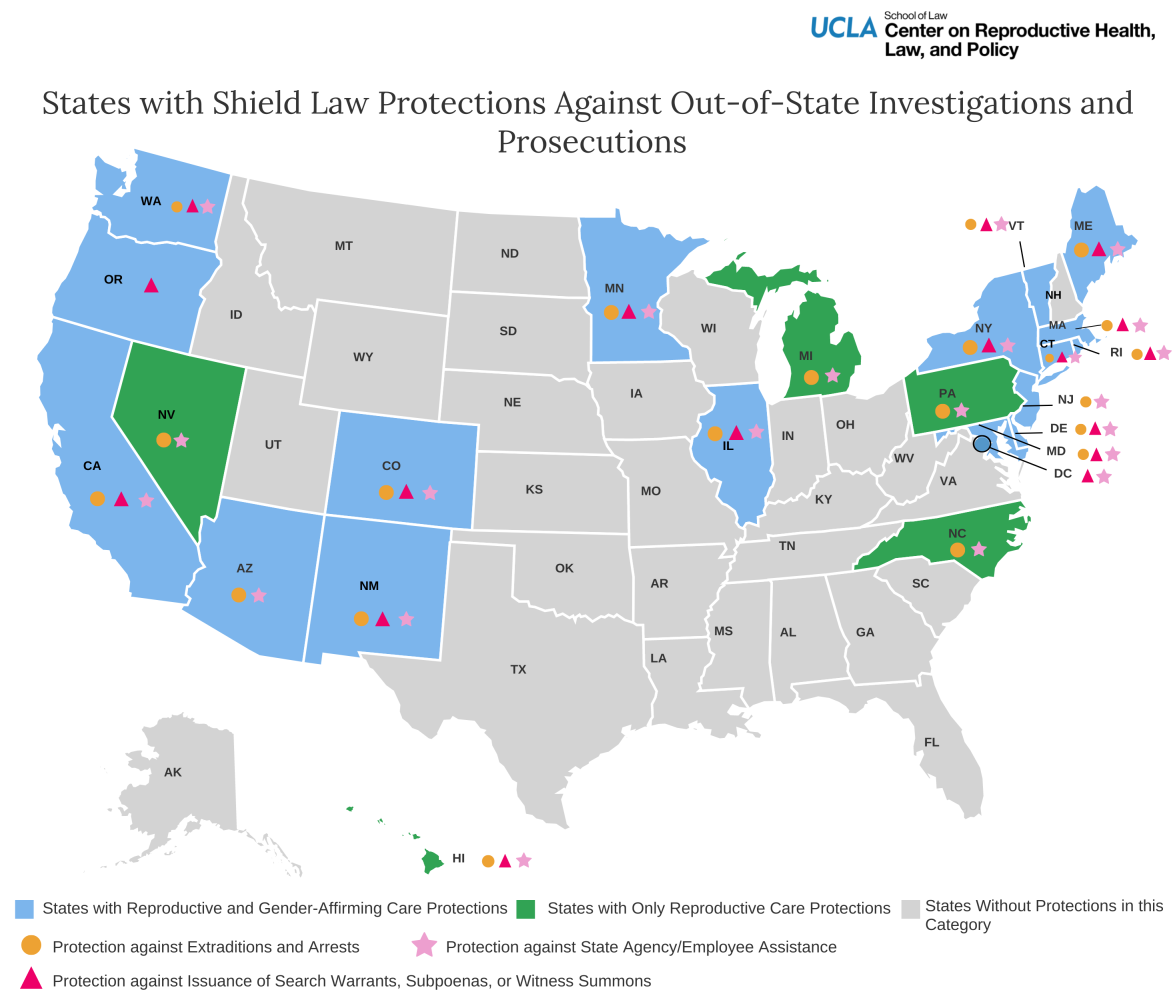
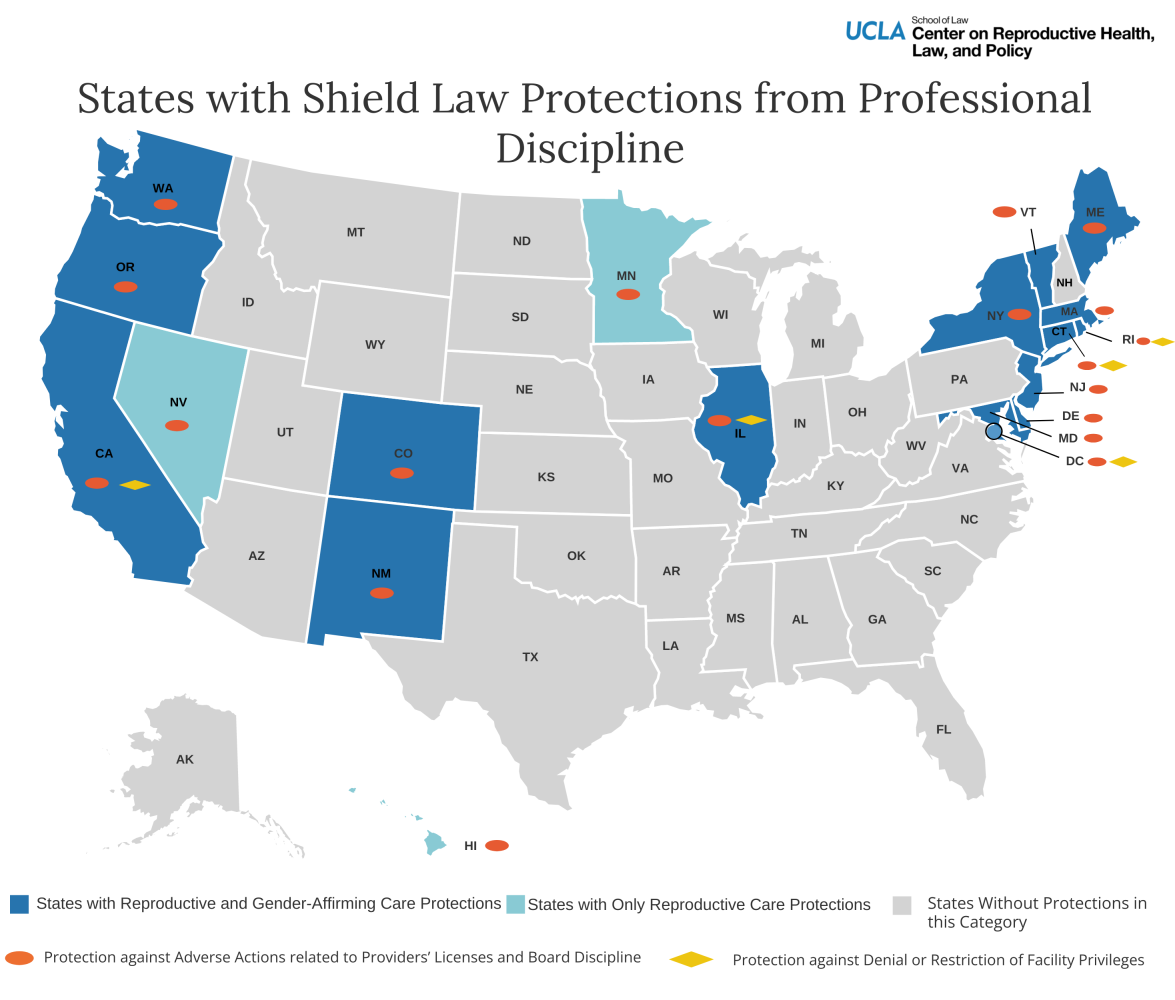
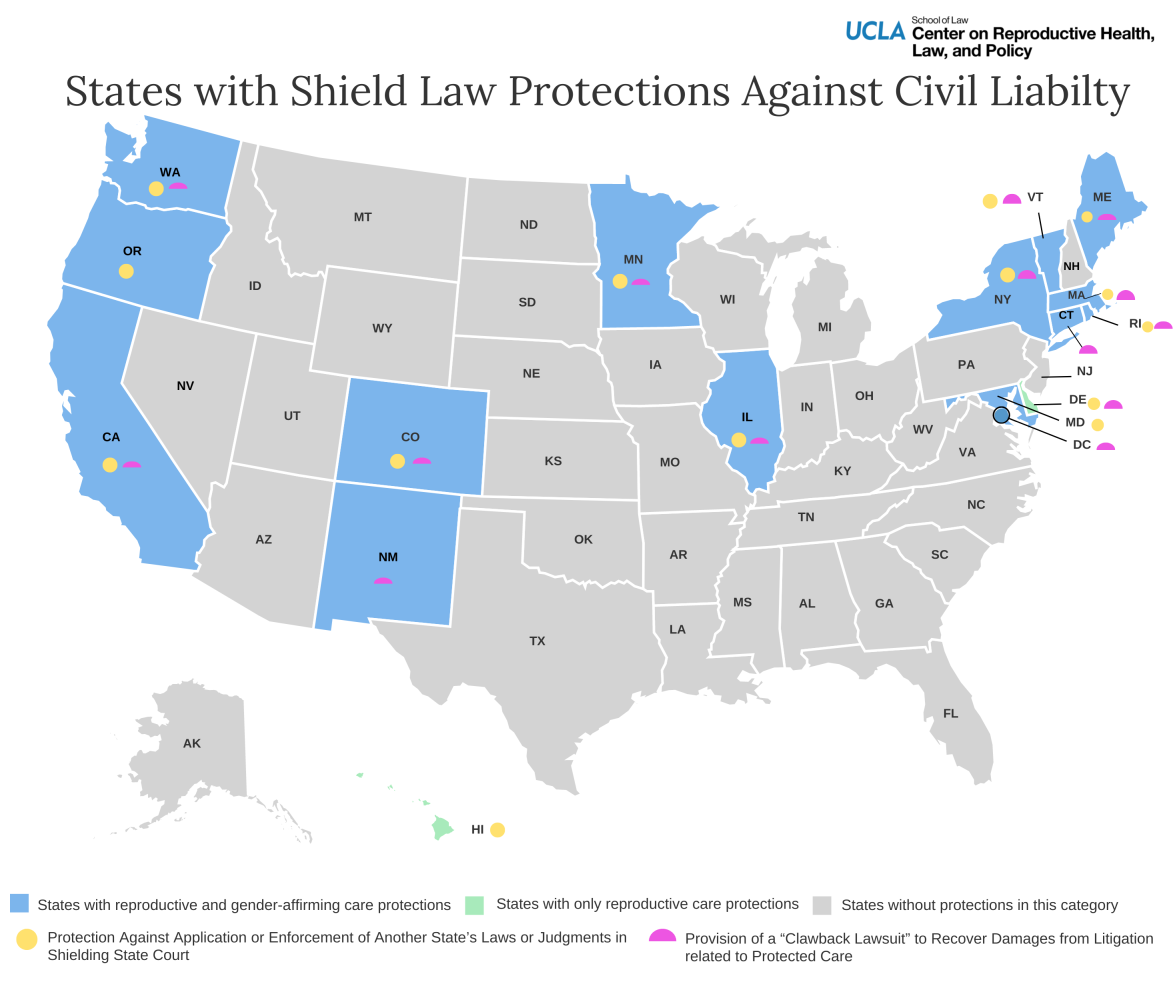
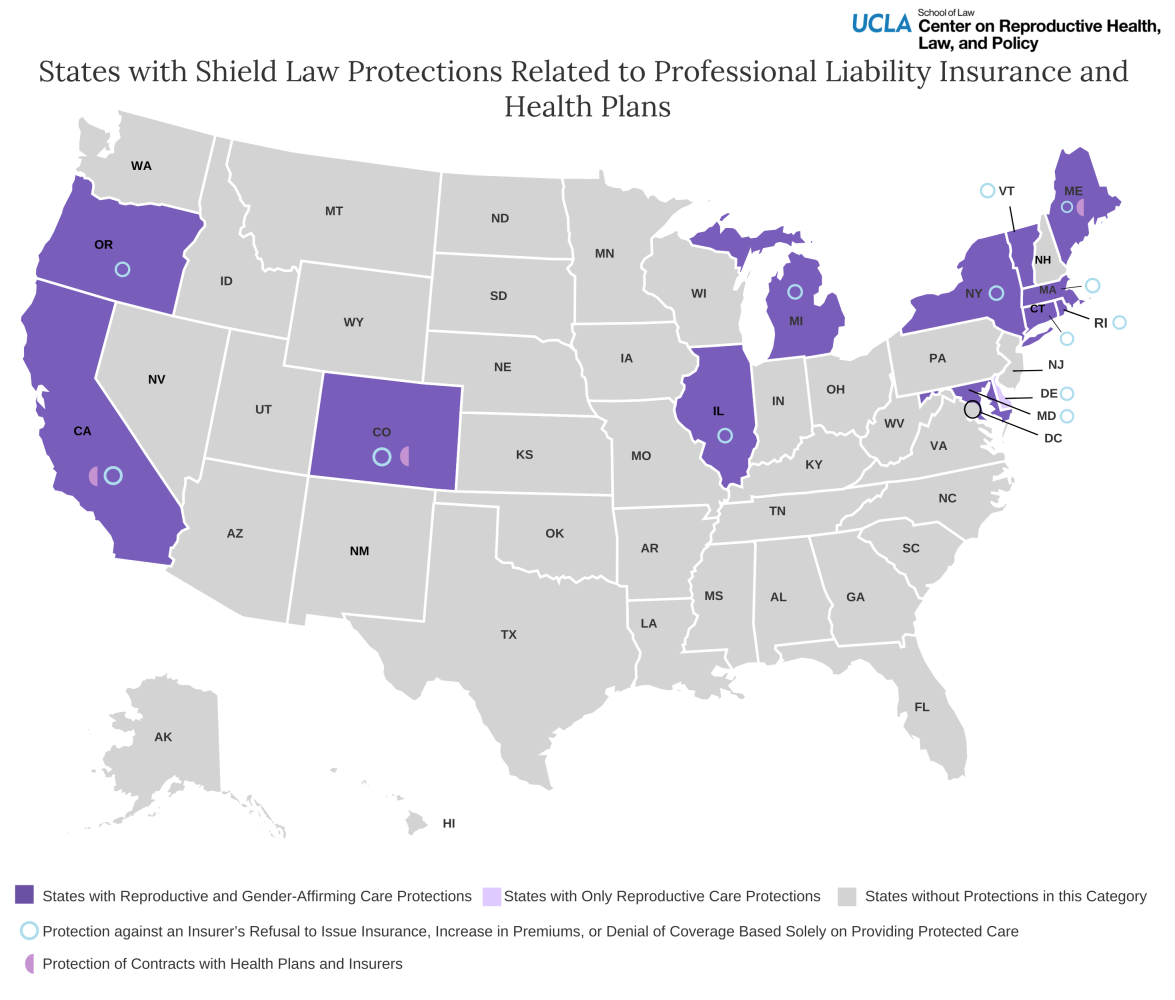
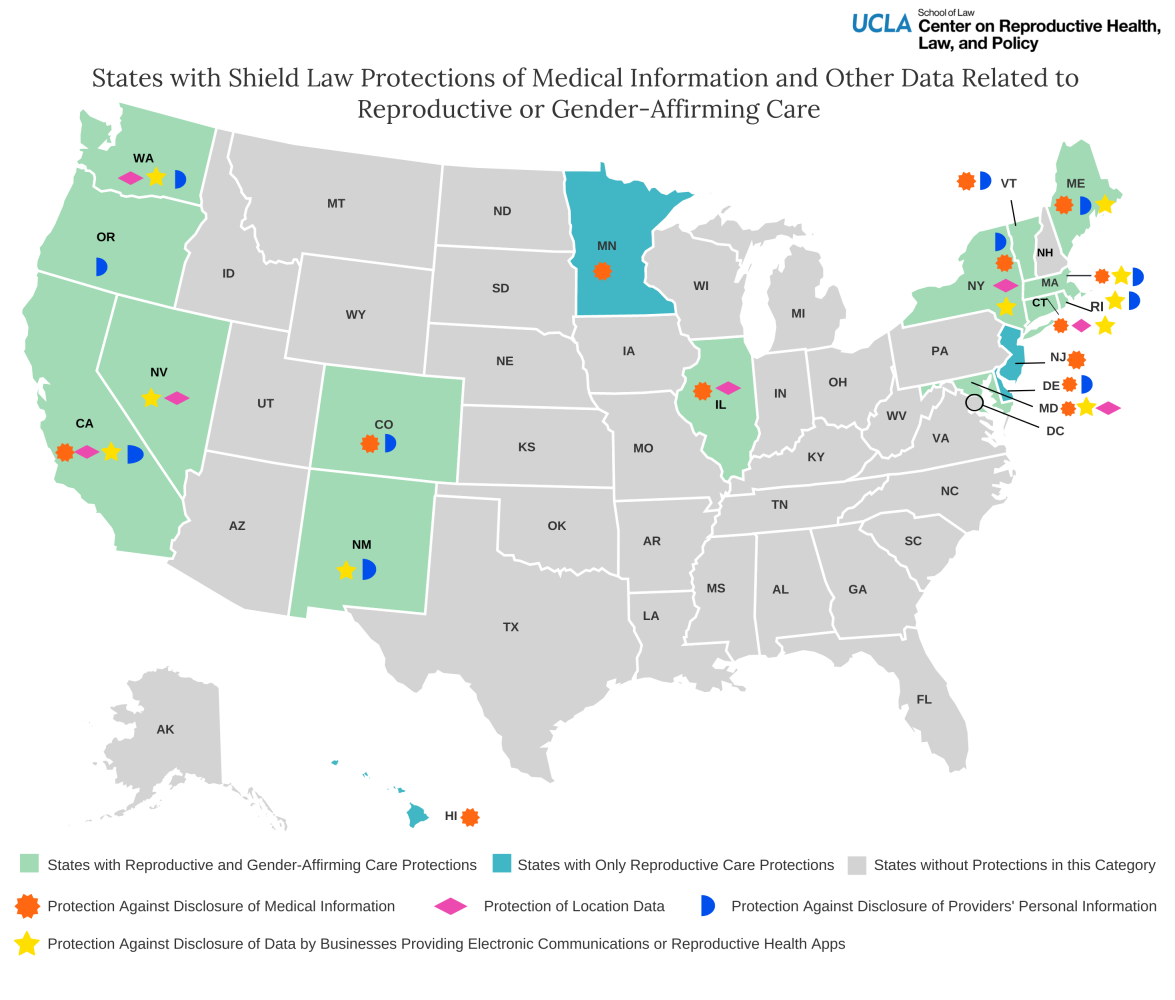
This State Law Guide is designed to provide a foundation on each state’s shield laws related to reproductive and gender-affirming health care. To receive pro bono legal assistance on questions related to the shield laws or other reproductive rights or justice issues, email larj@law.ucla.edu.
For general questions regarding the Center on Reproductive Health, Law, and Policy, email crhlp@law.ucla.edu.
The Williams Institute's 2024 NYC Fall Salon will take place on Thursday, September 12 from 6:00-8:30 PM at the Meta office in Hudson Yards.
We invite you to join our discussion on the current state of LGBTQ+ law and policy and what’s at stake in the upcoming November election and beyond.For tickets to our 2024 NYC Fall Salon, please visit: https://bit.ly/NYCFallSalon24RSVP ends on September 4, 2024.
For more information, please contact Williamsdev@law.ucla.edu.